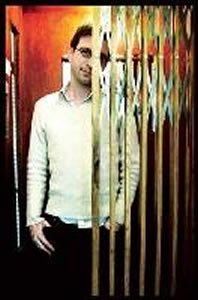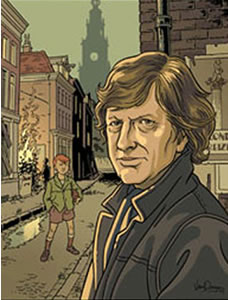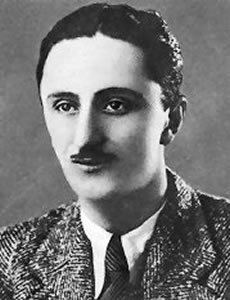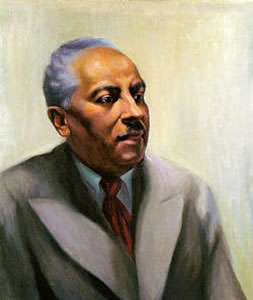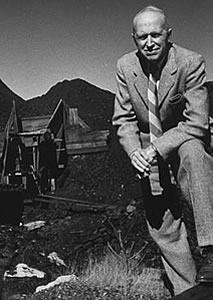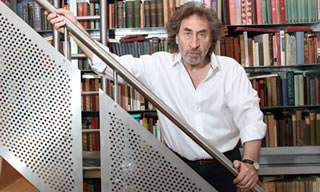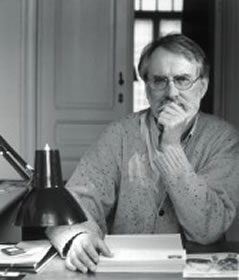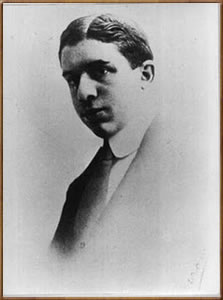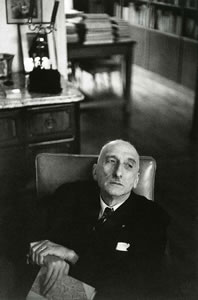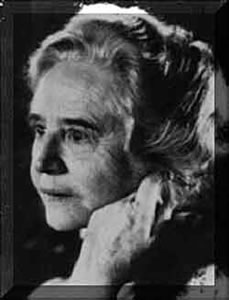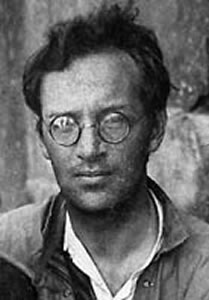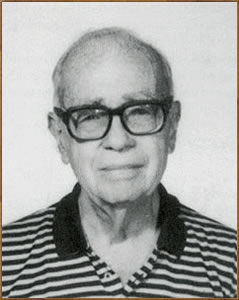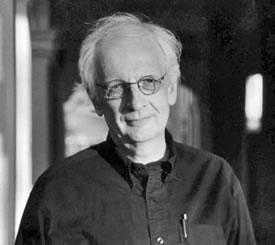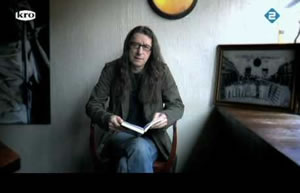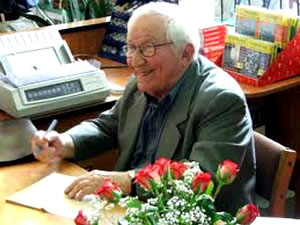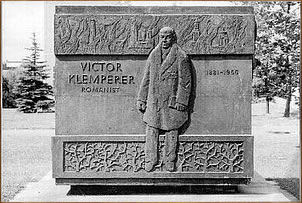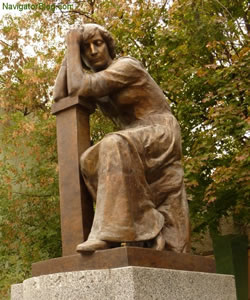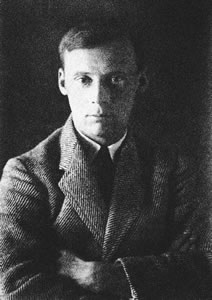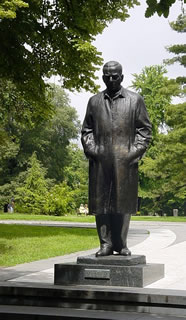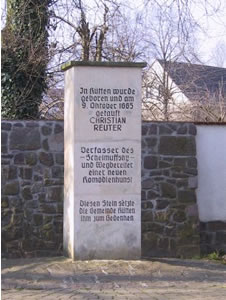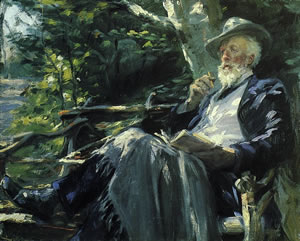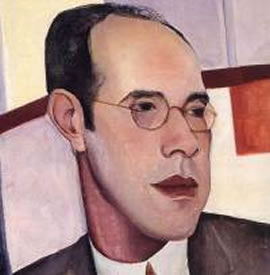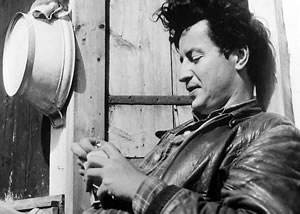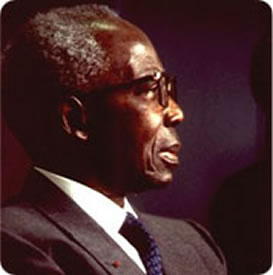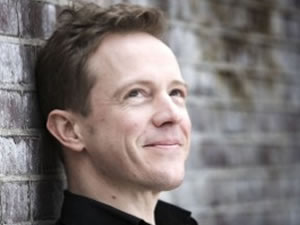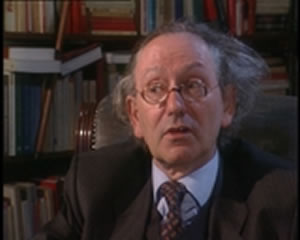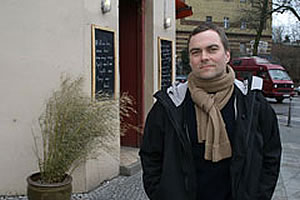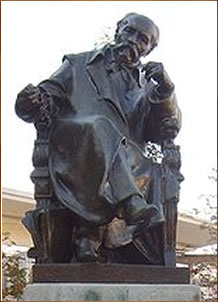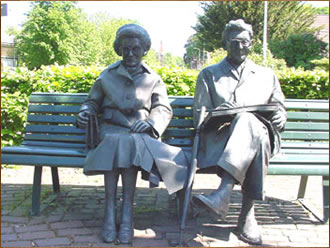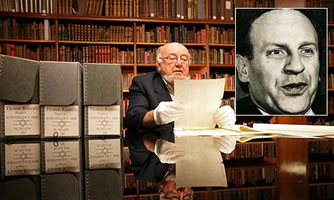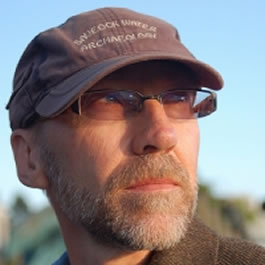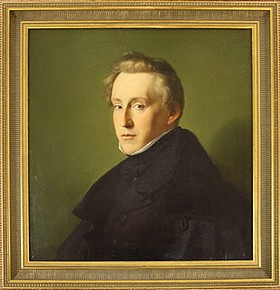De Nederlandse schrijver Ferdinand Bordewijk werd geboren op 10 oktober 1884 in Den Haag. Zie ook mijn blog van 10 oktober 2010 en eveneens alle tags voor Ferdinand Bordewijk op dit blog.
Uit: Bint
“Was de hel van de grootste geestelijke eentonigheid? De Bree deed dien nacht weer een paar maal zijn ronde. Hij had een zaktoorts. Hij richtte dien naar de plafonds. In de flauwe schemering lagen zij stil, of snurkend, of woelend. Een had zijn dek weggetrapt. Hij legde het recht.
Dien morgen was hij vroeg op, als altijd. Van den waard hoorde hij dat er twee waren weggegaan, zeker een eind om.
– Met de fiets?
– Met de vélo.
– Hoe lang geleden?
– O, al een uur of twee.
De Bree ging naar boven. Er lag een vore tusschen zijn wenkbrauwen. Hij kwam in de kamers. Ze waren allen wakker. Ze hadden gestoeid of gevochten. Ze hadden zich voor den vorm weer toegedekt. Hun bloote teenen staken onderuit de dekens.
Hij kwam in een kamer waar er maar één lag. Heiligenleven en Punselie waren weg. Van der Karbargenbok lag naar hem te kijken, dek tot zijn kin, snavelerboven, kleine oogen somber gloeiend.
– En nou jij.
De Bree trok hem aan zijn kopveeren uit het nest.
– Waar zijn die twee?
– Weet niet.
– Kerel, als je het me niet zegt, krijg je een trap onder je …..
Hij hield op. De gier stond er bij, woedend en vernederd. De Bree begreep in een flits wat er in hem omging. Hij wist misschien niet waar de anderen waren heengegaan. Hij had het wel gezien, maar hij had niet meegewild. Hij had het gewild en toch ook niet gewild. Hij was vernederd omdat de anderen de eenheid hadden verbroken. Hij was woedend omdat hij niet met hen was meegegaan. De Bree moest ten slotte waardeeren, dat de saamhoorigheid het had gewonnen. Wist hij hun doel dan kon hij toch niet klikken.
De gier staarde naar den grond. Hadden de anderen een verleidelijk beeld opgehangen van een reis naar de verte, naar de Middellandsche Zee, werken en bedelen onderweg?
De Bree was woedend als de gier.
– Kleed je aan, zei hij alleen.”

Ferdinand Bordewijk (10 oktober 1884 – 28 april 1965)
De Nederlandse dichter en vertaler Menno Wigman werd geboren in Beverwijk op 10 oktober 1966. Zie ook mijn blog van 10 oktober 2010 en eveneens alle tags voor Menno Wigman op dit blog.
De kunst van het feesten
is de kunst je als een kenner te vervelen
en langzaam, slok na slok, de doffe streken
van het daglicht te vergeten, is de kunst
je lichter te bewegen, wild en wilder
alle hoop en wanhoop van je af te slaan,
is de kunst een schoonheid te bewegen
naar het Prado van je bed te gaan.
Bijna dertig
Nee, die juli bracht bepaald geen
revolutie in mijn bed. Hoe de zomer
zich ook gaf, het leek te laat om nog
een nieuwe hartstocht op te lopen.
Dus dook ik onder voor het zwermen
van de lust en heulde vrolijk
met de slaap. Bijna dertig dacht ik,
wordt mij toch iets te helder. En ik zag
hoe alle parken overbloeiden,
hoe de hitte uit de hemel sloeg,
hoe de horde joeg op ander bloed
en zich vergrijpen wilde aan
een blonde levensgloed. En ik zag af.
Versliep de revolutie in mijn bed.
Vergat alvast te leven.
Aan een man in de supermarkt
En toen, gifmuze, kroop hij in mijn blik:
een man, klein, dik, met onbemand gezicht
die keek alsof hij Ron of Ruud moest heten.
En alles wat hij dacht was mij bekend:
belasting, voetbal, Emma, missverkiezing,
broccoli, koffiefilters – heel zijn mond
een dunne brief vol blanco levensdrift.
En ik was in verwachting van een scheef
gedicht, wou hem haten, kon het niet –
want alles wat hij droomt, dacht ik, droom ik
niet beter. Groet, gegroet dus, vale oom
die net zo magisch over lakens droomt.
De rij in, dan naar huis, deurmat, ijskast,
de bank, de oven, later weer die slaap.
Ik ben zo bang dat je niet eens bestaat.
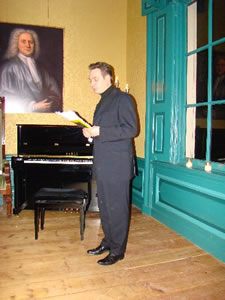
Menno Wigman (Beverwijk, 10 oktober 1966)
De Amerikaanse schrijver Jonathan Littell werd geboren in New York op 10 oktober 1967. Zie ook mijn blog van 10 oktober 2010 en eveneens alle tags voor Jonathan Littell op dit blog.
Uit: The Kindly Ones (Vertaald door Charlotte Mandell)
„Once, I found myself in Germany on a business trip; I was meeting the head of a big lingerie company, to sell him some lace. Some old friends had recommended me to him; so, without having to ask any questions, we both knew where we stood with each other. After our discussion, which went quite well, he got up, took a book down from his shelf, and handed it to me. It was the posthumous memoirs of Hans Frank, the Generalgouverneur of Poland; it was called Facing the Gallows. “I got a letter from Frank’s widow,” he said. “She had the manuscript, which he wrote after his trial, published at her own expense; now she’s selling the book to provide for her children. Can you imagine that? The widow of the Generalgouverneur! – I ordered twenty copies from her, to use as gifts. And I advised all my department chiefs to buy one. She wrote me a moving letter of thanks. Did you know him?” I assured him I hadn’t, but that I would read the book with interest. Actually I had run into Hans Frank once, briefly, maybe I’ll tell you about it later on, if I have the courage or the patience. But just then it would have made no sense talking about it. The book in any case was awful – confused, whining, steeped in a curious kind of religious hypocrisy. These notes of mine might be confused and awful too, but I’ll do my best to be clear; I can assure you that they will at least be free of any form of contrition. I do not regret anything: I did my work, that’s all; as for my family problems, which I might also talk about, they concern no one but me; and as for the rest, I probably did go a little far toward the end, but by that point I was no longer entirely myself, I was off-balance, and anyhow the whole world was toppling around me, I wasn’t the only one who lost his head, admit it. Also, I’m not writing to feed my widow and children, I’m quite capable of providing for them. No, if I have finally decided to write, it really is probably just to pass the time, and also, possibly, to clear up one or two obscure points, for you perhaps and for myself.“

Jonathan Littell (New York, 10 oktober 1967)
De Duitse schrijver, tekenaar en musicus Eugen Egner werd geboren op 10 oktober 1951 in Ingelfingen. Zie ook alle tags voor Eugen Egner op dit blog en ook mijn blog van 10 oktober 2010 en ook mijn blog van 10 oktober 2009.
Uit: Dies ist gar keine richtige Geschichte
„In letzter Zeit werde ich oft fälschlicherweise für einen Postboten gehalten. Einmal geschah es, daß ich stundenlang völlig selbstvergessen vor dem Gartentor eines Einfamilienhauses verharrte, als traute ich mich wegen eines bissigen Hundes nicht auf das Grundstück.
Im Vorgarten, gleich neben dem Weg zum Haus, stand ein aus vier Holzstücken kreuz und quer zusammengenageltes Gebilde, in dessen Betrachtung ich mich nun vertiefte, bis endlich ein Mann mittleren Alters aus dem Haus gelaufen kam und mir zurief: »Keine Angst, das ist kein richtiger Hund!«
Er öffnete das Törchen, um mich, den vermeintlichen Postboten, einzulassen. Ich tat erleichtert und zog ein paar Briefe aus der Tasche. (Längst habe ich mir angewöhnt, in solchen Situationen den Leuten ein wenig Post zu überreichen, damit keine langen Diskussionen entstehen.) Der Mann ging die Briefe durch.
»Nur wieder Reklame und Rechnungen«, kommentierte er mürrisch.
Ich schlug vor: »Die Rechnungen können Sie gleich bei mir bezahlen.«
»Später«, antwortete er. »Kommen Sie doch mit ins Haus, ich möchte Ihnen etwas zeigen.«
»Geht es um Holz?«
»In der Tat, ja«, erwiderte der Mann verblüfft, »woher wissen Sie das?«
Ich schwieg, um eine geheimnisvolle Wirkung bemüht. In der Diele gesellte sich die Ehefrau zu uns.
»Zeigen wir es ihm?« fragte sie ihren Mann.
Er nickte: »Ich denke schon.«
»Sind Sie ein Ästhet?« erkundigte sie sich sodann bei mir. »Letzte Woche hatten wir nämlich einen homosexuellen Dichter hier, der interessierte sich nicht dafür.«
»Laß ihn, Margret«, sprach der Ehemann besänftigend.
»Ich sehe es in seinen Augen, er hat gewiß den rechten Sinn dafür.«
Inzwischen hatte uns das Wohnzimmer aufgenommen.“

Eugen Egner (Ingelfingen, 10 oktober 1951)
De Catalaanse schrijfster Mercè Rodoreda werd geboren op 10 oktober 1908 in Barcelona. Zie ook alle tags voor Mercè Rodoreda op dit blog en ook mijn blog van 10 oktober 2010 en ook mijn blog van 10 oktober 2009.
Uit: The Salamander (Vertaald door Martha Tennent)
„I strolled down to the water, beneath the willow tree and through the watercress bed. When I reached the pond I knelt down. As always, the frogs gathered around me. Whenever I arrived, they would appear and come jumping toward me. As soon as I started to comb my hair, the mischievous ones would stroke my red skirt with the five little braids or pull at the festoon on my petticoat full of ruffles and tucks. The water would grow sad and the trees that climbed the hill would gradually blacken. But that day the frogs jumped into the water, shattering the mirror in the pond, and when the water grew still again his face appeared beside mine, as if two shadows were observing me from the other side. So as not to give the appearance of being frightened, I stood up and without saying a word began walking calmly through the grass. But the moment I heard him following me, I looked back and stopped. A hush fell over everything, and one end of the sky was already sprayed with stars. He stopped a short distance away and I didn’t know what to do. I was suddenly filled with fear and began to run, but when I realized he would overtake me, I stopped under the willow tree, my back to the trunk. He came to me and stood there, both arms spread wide so I could not run away. Then, gazing into my eyes, he began to press me against the willow, my hair disheveled, between the willow and him. I bit my lips to keep from screaming; the pain in my chest was so great I thought my bones were on the point of breaking. He placed his mouth on my neck, and where he had laid his mouth I felt a burning.”

Mercè Rodoreda (10 oktober 1908 – 13 april 1983)
De Britse schrijver Harold Pinter werd geboren op 10 oktober 1930 in Londen. Zie ook mijn blog van 10 oktober 2010 en eveneens alle tags voor Harold Pinter op dit blog.
Uit Press Conference
„PRESS Sir, before you became Minister of Culture I believe you were the head of the Secret Police.
MINISTER That is correct.
PRESS Do you find any contradiction between those two roles?
MINISTER None whatsoever. As head of the Secret Police it was my responsibility, specifically, to protect and to safeguard our cultural inheritance against forces which were intent upon subverting it. We were defending ourselves against the worm. And we still are.
PRESS The worm?
MINISTER The worm.
PRESS As head of the Secret Police what was your policy towards children?
MINISTER We saw children as a threat if – that is – they were children of subversive families.
PRESS So how did you employ your policy towards them?
MINISTER We abducted them and brought them up properly or we killed them.
PRESS How did you kill them? What was the method adopted?
MINISTER We broke their necks.
PRESS And women?
MINISTER We raped them. It was all part of an educational process, you see. A cultural process.
PRESS What was the nature of the culture you were proposing?
MINISTER A culture based on respect and the rule of law.
PRESS How do you understand you present role as Minister of Culture?
MINISTER The Ministry of Culture hold to the same principles as the guardians of National Security. We believe in a healthy, muscular, and tender understanding of our cultural heritage and our cultural obligations. These obligations naturally include loyalty to the free market.
PRESS How about cultural diversity?
MINISTER We subscribe to cultural diversity; we have faith in a flexible and vigorous exchange of views; we believe in fecundity.“
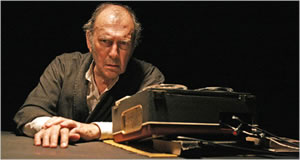
Harold Pinter (10 oktober 1930 – 24 december 2008)
Hier als acteur in Samuel Beckett’s “Krapp’s Last Tape“
De Franse schrijver Claude Simon werd geboren op 10 oktober 1913 te Tananarive (Madagaskar) als zoon van een Franse legerofficier. Zie ook alle tags voor Clauder Simon op dit blog en ook mijn blog van 10 oktober 2010 en ook mijn blog van 10 oktober 2009.
Uit: Les Géorgiques
„Cette longue description de la maison de la vieille dame et en particulier ce passage du placard où sont enfouies les preuves du crime du général laissent apparaître de façon nette l’importance du secret dans la vie de la famille et en particulier de la vieille dame qui, ayant gardé cachés ces papiers au point qu’ils sont devenus un poids, se sent soulagée à l’idée de mourir. Mais c’est sans compter sur l’oncle Charles qui va distiller tout le secret puisque c’est lui qui va transmettre les papiers et donc faire éclater la vérité. […]
[…] La description du cadavre ne nous laisse donc aucun doute sur le décès de la vieille dame comme le montrent la périphrase « la gisante » et l’expression « dernière garde pour qu’elle emporte dans sa tombe » : l’arrière-petite-fille du général est morte chez elle, au plus près de son secret. Dans la première partie du texte, on comprend bien que la vieille dame a espéré emporter avec elle le secret dans sa tombe comme le dit clairement ce fragment de phrase : « qu’une fois morte, une fois la dernière chair du nom disparue, cela n’aurait alors plus d’importance ».

Claude Simon (10 oktober 1913 – 6 juli 2005)
De Antilliaanse (Curaçaose) schrijver Willem Cornelis Jacobus (Boeli) van Leeuwen werd geboren op 10 oktober 1922 op Curaçao. Zie ook mijn blog van 10 oktober 2010 en eveneens alle tags voor Boeli van Leeuwen op dit blog.
Uit: De gorilla
‘In Berlijn te zijn geweest in een dierentuin versierd met flamingoveren, waar ik de grootste gorilla ter wereld heb zien sterven van angst en het paard van Johannes in een brandende etalage heb ontmoet en in een schuilkelder een vrouw met de rug van een wezel heb gestreeld, om daarna in Leiden rechten te studeren…! […] Wat te beginnen met de verlate puberteitsriten van het corps, de platvloersheid van de professoren – wat moet een creool uit Curaçao daarmee beginnen? Hij die onsterfelijk is geweest op de rand van het bestaan, kon geen groentjes verdragen met kaalgeschoren koppen, want hij heeft kaalgeschoren koppen gezien op levende doodshoofden.’
Uit: De Rots der struikeling
„Niemand wandert ungestraft unter Palmen: wij hebben reeds te lang onder verdorde kokosbomen gelopen, die nog op vervallen plantages te vinden zijn. In het isolement van een benauwde gemeenschap, gevangen in de melancholie van onze eigen situatie, zien we geslachten ten onder gaan als bomen, die langzaam in de dorre grond door gebrek aan voedsel sterven.“

Boeli van Leeuwen (10 oktober 1922 – 28 november 2007)
De Russische dichter en schrijver Ivan Aleksejevitsj Boenin werd geboren in Voronezj op 10 oktober 1870. Zie ook mijn blog van 10 oktober 2009 en ook mijn blog van 10 oktober 2010.
Midnight
November. Midnight damp. Chalk-white beneath
The moon the village lies, by the oppressive
Hush overcome. The tide sweeps in, impassive,
Its voice all deep solemnity and breadth.
The port flag, soaked, droops on its slender mast.
Just o’er the mast, above the mass of hazy
Clouds torn in parts and running swiftly east,
The disc of moon glides, strangely white and glassy.
I reach the steps. Mysterious the light
And duller here, the tide’s voice fiercer, louder.
The bathhouse piles, defenseless, heave and shudder.
Far out – a grey abyss. No sea in sight.
Below, amid the foam that seethes and hisses,
Like seals wet by the surf the boulders glisten.
The Bedouin
The Dead Sea, and, beyond, the greyish, broken
Line of the hills. Noon. Mealtime. Deft of hand,
He bathes his mare, then sits a hookah smoking
On Jordan’s shore. Like molten bronze the sand.
The Dead Sea, and, beyond, in space suspended,
Mirages swimming in a golden haze.
Light. Warmth. A wild dove coos. The oleander
And storksbill with the reds of springtime blaze.
He sits, a hooded hawk, and smokes, and raises
His voice in song, and, droning sleepily,
The tamarisk and oleander praises.
Bard, robber, nomad tribesman, glad is he
To coils of smoke in simple verse and flowing
The peaks to liken beyond Siddim showing!
Vertaald door Natasha Bulashova en Greg Cole

Ivan Boenin (10 oktober 1870 – 8 november 1953)
De Amerikaanse schrijver Frederick Barthelme werd geboren op 10 oktober 1943 in Houston, Texas. Zie ook mijn blog van 10 oktober 2009 en ook mijn blog van 10 oktober 2010.
Uit: Waveland
„A year after Katrina swept across the Mississippi Gulf Coast and destroyed everything in or near its path, Vaughn Williams was spending a quiet fall afternoon with the television, waiting for his new girlfriend, Greta Del Mar, to get home from work. It was raining and out the window of Greta’s bungalow, where he’d been living for the last two months, he could still see the devastation of the landscape–everything was gone, vanished, flattened. Three houses on this block of Mary Magdalene Street survived, a few others spotted the landscape here and there, but the rest were leveled. Waveland looked like one of those unpopulated atolls in the Pacific people were always doing TV specials about. Bombing range stuff. By now, a year after the storm, there were a few trailers up on concrete blocks, some tents hooked onto pickups, but that was it. He and Greta were like shipwreck victims washed up on some -blown–out shore. Vaughn was ten years older than Greta, both of them split from their spouses–he by divorce, she by the still-unsolved killing of her husband, Bo, a half-decade before. He’d been shot in the head in his sleep. Their marriage hadn’t been pretty, stuffed with Bo’s infidelities, abuse, ridicule, and embarrassment, but worse was the aftermath, when Greta was indicted for the crime. She was exonerated, of course, and the charges were dismissed; but too much damage was already done.“
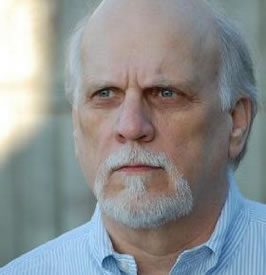
Frederick Barthelme (Houston, 10 oktober 1943)
De Indiase schrijver Rasipuran Krishnaswami Narayan werd geboren op 10 oktober 1906 in Madras. Zie ook mijn blog van 10 oktober 2009 en ook mijn blog van 10 oktober 2010.
Uit: The English Teacher
“Wife, child, brothers, parents, friends…We come together only to go apart again. It is one continuous movement. They move away from us as we move away from them. The law of life cannot be avoided. The law comes into operation the moment we detach ourselves from our mother’s womb. All struggle and misery in life is due to our attempt to arrest this law or get away from it or in allowing ourselves to be hurt by it. The fact must be recognized. A profound unmitigated loneliness is the only truth of life. All else is false.”
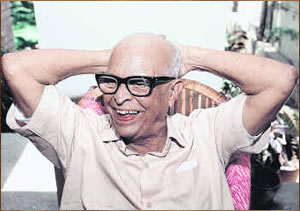
R. K. Narayan (10 oktober 1906 – 13 mei 2001)
De Brits – Amerikaanse schrijver en regisseur James Clavell (pseudoniem van Charles Edmund DuMaresq de Clavelle) werd geboren op 10 oktober 1924 in Sydney. Zie ookmijn blog van 10 oktober 2008 en ook mijn blog van 10 oktober 2009.
Uit: King Rat
“I’m going to get that bloody bastard if I die in the attempt.” Lieutenant Grey was glad that at last he had spoken aloud what had so long been twisting his guts into a knot. The venom in Grey’s voice snapped Sergeant Masters out of his reverie. He had been thinking about a bottle of ice-cold Australian beer and a steak with a fried egg on top and his home in Sydney and his wife and the breasts and smell of her. He didn’t bother to follow the lieutenant’s gaze out the window. He knew who it had to be among the half-naked men walking the dirt path which skirted the barbed fence. But he was surprised at Grey’s outburst. Usually the Provost Marshal of Changi was as tight-lipped and unapproachable as any Englishman.
“Save your strength, Lieutenant,” Masters said wearily, “the Japs’ll fix him soon enough.”
“Bugger the Japs,” Grey said. “I want to catch him. I want him in this jail. And when I’ve done with him—I want him in Utram Road Jail.” Masters looked up aghast. “Utram Road?”
“Certainly.”
“My oath, I can understand you wanting to get him,” Masters said, “but, well, I wouldn’t wish that on anyone.”
“That’s where he belongs. And that’s where I’m going to put him. Because he’s a thief, a liar, a cheat and a bloodsucker. A bloody vampire who feeds on the rest of us.”
Grey got up and went closer to the window ofthe sweltering MP hut. He waved at the flies which swarmed from the plank floors and squinted his eyes against the refracted glare of the high noon light beating the packed earth. “By God,” he said, “I’ll have vengeance for all of us.”
Good luck, mate, Masters thought. You can get the King if anyone can. You’ve got the right amount of hate in you. Masters did not like officers and did not like Military Police. He particularly despised Grey, for Grey had been promoted from the ranks and tried to hide this fact from others.“

James Clavell (10 oktober 1924 – 6 september 1994)
De Nederlandse dichteres, schrijfster en illustrator Rie Cramer werd geboren in Sukabumi op Java, ndonesië op 10 oktober 1887. Zie ook mijn blog van 10 oktober 2009 en ook mijn blog van 10 oktober 2010.
Eén in uw diep verdriet
Holland, hoe hebben wij zoovele malen
Uw knusse kalmte hekelend, bespot,
Hoe spraken wij, verwaten, vreemde talen,
En waren zonder aandacht voor uw lot.
Maar zie, – nu weten wij ons diep verbonden,
Ons brandt eenzelfde smaad, eenzelfde smart,
Nu bloeden wij, verscheurd uit eendre wonden,
Nu bonkt ons hart naast aan uw eigen hart.
Nu liggen wij des nachts in ’t donker wakker
En voelen bang het trillen van uw grond,
Als lagen wij dicht naast een ouden makker,
Wakend, waar hij ten doode werd gewond.
Hoe schrijnt het heimwee, nu w’u zien gehavend,
Naar oude stadjes in hun milde rust,
En naar uw weiden, dauwend in den avond,
En naar het wonder van uw zilvren kust.
Naar hooge lanen om een vredig buiten,
Naar ’t kleppend klokje van een klein gehucht.
Naar blanke vaarten, donkre visschersschuiten,
En naar de wijdheid van uw wolkenlucht.
Hoe is het, dat ons hart zoo zelden heugde
De blijdschap om dit schoon, vertrouwd verschiet?
Holland, – nu het te laat is voor uw vreugde,
Laat ons dan één zijn in uw diep verdriet!
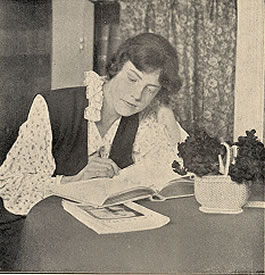
Rie Cramer (10 oktober 1887 – 18 juli 1977)
De Australische dichteres en schrijfster Louise Mack werd geboren op 10 oktober 1870 in Hobart, Tasmania. Zie ook mijn blog van 10 oktober 2009.
To Sydney
CITY, I never told you yet—
O little City, let me tell—
A secret woven of your wiles,
Dear City with the angel face,
And you will hear with frowning grace,
Or will you break in summer smiles?
This is the secret, little town,
Lying so lightly towards the sea;
City, my secret has no art,
Dear City with the golden door;
But oh, the whispers I would pour
Into your ears—into your heart!
You are my lover, little place,
Lying so sweetly all alone.
And yet I cannot, cannot tell
My secret, for the voice will break
That tries to tell of all the ache
Of this poor heart beneath your spell.
Dreaming, I tell you all my tale;
Tell how the tides that wash your feet
Sink through my heart and cut its cords.
Dreaming, I hold my arms, and drag
All, all into my heart—the flag
On the low hill turned harbourwards,
And all the curving little bays,
The hot, dust-ridden, narrow streets,
The languid turquoise of the sky,
The gardens flowing to the wave,
I drag them in. O City, save
The grave for me where I must lie.
Yet humbly I would try to build
Stone upon stone for this town’s sake;
Humbly would try for you to aid
Those whose wise love for you will rear
White monuments far off and near,
White, but unsoiled, undesecrate.

Louise Mack (10 oktober 1870 – 23 november 1935)
De Finse dichter en schrijver Aleksis Kivi werd geboren als geboren Alexis Stenvall in Palojoki op 10 oktober 1834. Zie ook mijn blog van 10 oktober 2009 en ook mijn blog van 10 oktober 2010.
Uit: Seven Brothers
“JUHANI: On one corner of the earth a day of peace still gleams for us. Ilvesjärvi lake yonder, below Impivaara, is the harbour to which we can sail away from the storm. Now my mind is made up.
LAURI: Mine was made up last year already.
EERO: I’ll follow you even into the deepest cave on Impivaara, where it is said the Old Man of the Mountains boils pitch, with a helmet made of a hundred sheepskins on his head.
TUOMAS: We’ll all move there from here.
JUHANI: Thither we’ll move and built a new world.”

Aleksis Kivi (10 oktober 1834 – 31 december 1872)
Standbeeld in Helsinki
De Nederlandse dichter en schrijver Robidé van der Aa (eig. Christianus Petrus Eliza van der Aa) werd geboren op 10 oktober 1791 in Oosterbeek. Zie ook mijn blog van 10 oktober 2009 en ook mijn blog van 10 oktober 2010.
Herfstliedje
Wie Lente bezinge, wij wijden ons lied
Het vruchtbaarst saizoen, dat er daagt;
Wanneer ons de tuin zijne bloemen nog biedt,
De boomgaard zijn vruchten reeds draagt;
Als ’t appeltje, gloeijend van sierelijk rood,
Ons lacht uit het looverdak aan,
De saprijke peer als tot plukken ons noodt,
De wingerd zoo rijk is belaân.
’t Is feest voor de landjeugd in boomgaard en veld,
Als, najaar, ge uw schatten ons biedt;
Daarom wordt gij vrolijk en dankbaar vermeld,
En wijden we u heden ons lied.
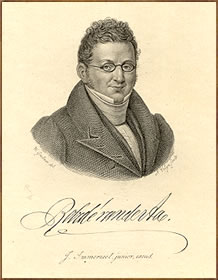
Robidé van der Aa (7 oktober 1791 – 14 mei 1851)
De Amerikaanse schrijver, zakenman en officier Kermit Roosevelt sr. Werd geboren op 10 oktober 1889 in Sagamore Hill in Oyster Bay, New York. Zie ook mijn blog van 10 oktober 2009.
Uit: War In The Garden Of Eden
„It was at Taranto that we embarked for Mesopotamia. Reinforcements were sent out from England in one of two ways–either all the way round the Cape of Good Hope, or by train through France and Italy down to the desolate little seaport of Taranto, and thence by transport over to Egypt, through the Suez Canal, and on down the Red Sea to the Indian Ocean and the Persian Gulf. The latter method was by far the shorter, but the submarine situation in the Mediterranean was such that convoying troops was a matter of great difficulty. Taranto is an ancient Greek town, situated at the mouth of a landlocked harbor, the entrance to which is a narrow channel, certainly not more than two hundred yards across. The old part of the town is built on a hill, and the alleys and runways winding among the great stone dwellings serve as streets. As is the case with maritime towns, it is along the wharfs that the most interest centres. During one afternoon I wandered through the old town and listened to the fisherfolk singing as they overhauled and mended their nets. Grouped around a stone archway sat six or seven women and girls. They were evidently members of one family–a grandmother, her daughters, and their children.
The old woman, wild, dark, and hawk-featured, was blind, and as she knitted she chanted some verses. I could only understand occasional words and phrases, but it was evidently a long epic. At intervals her listeners would break out in comments as they worked, but, like “Othere, the old sea-captain,” she “neither paused nor stirred.”

Kermit Roosevelt sr. (10 oktober 1889 – 4 juni 1943)
Portret door John Singer Sargent
